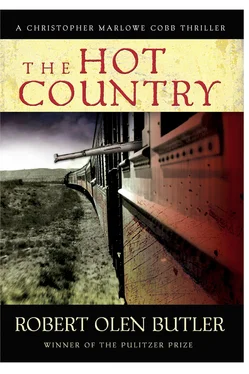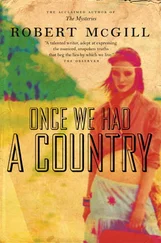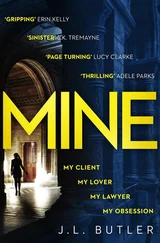I tried to shoo the girl out of my head by making myself consider the song: It was a big hit in the States a few years ago, but I wondered if beneath their gold hat brims, the boys in the band weren’t thinking about their own Kaiser Willie and how he might waltz us all around one of these days. If I were to write a piece on the German band in the Vera Cruz Plaza de Armas —which was possible if Woody simply were to have his Army settle down to cleaning up the filthy streets of this town and faux-govern a few Mexicans — then I was glad to have found this dandy little kicker for the end of the story. But given the other things of the past half hour or so that were still rattling around in my head, this was cold comfort and no permanent distraction for me. I heard the clang of a bell float in over the music. An electric trolley was coming up the avenida from the south, and now I was actually on the verge of hopping on and heading up a few stops to the red-light district and finding a professional girl.
There were very good reasons not to do this either. So I was glad to have Bunky appear in the nick of time and sit heavily down.
“What’s his story?” I asked.
Bunky shrugged. “Like we said. It’s about money.”
I’d had too much of the aguardiente, of course, and so it took the boy’s actually coming into my room and shaking me by the shoulder to wake me, which I’d instructed him to do.
“Señor, señor,” he was saying to me as I struggled up from a dream about Mother, who was kneeling on the pavement on the far side of La Parroquía, her head and shoulders shrouded in a rebozo, lifting her bloody hands before her, Señora Macbeth, claiming that it would take but a little water to clear her of this deed. But with the boy’s shaking of my shoulder, she melted, thawed, and resolved herself into a dew, and I snapped fully awake. Even the hot bloat in my head dissipated as I threw on my clothes, and the boy said, “Some small boat is launching from the ship you have me watch.” I grabbed my binoculars and I followed him out the door and into the street and we beat it east on Calle de Benito Juárez, along the northern edge of the zócalo, and we were approaching the docks pretty quick.
The harbor and the ship weren’t visible yet as we came up on the wide, stone-columned Custom House and, beyond it, the back of the massive, monolithic row of pitch-roofed storehouses along the waterfront. I reached out and put a hand on the boy’s shoulder and stopped him.
He turned to me. There was nearly a full moon, and he was a good boy, Diego, the eyes of his upturned face bright in the moonlight. He was ready to do whatever I needed him for, and not, it seemed to me, just for the money, but for the boy’s sport of it. A good boy, this one. I pulled out his silver half-dollar, and as I gave it to him, I put my forefinger to my lips. He nodded at me, my wee conspirator.
“Another time I’ll have more for you,” I whispered to him.
He gave me a second nod and vanished in a flash back up the calle . I turned toward the harbor.
I figured it was best to stay out of sight: In spite of our military trying hard now to make the city seem as normal as possible, whoever was coming in from the Ypiranga had decided to do it at the most inconspicuous time possible, and they would not give up their story just because a reporter had the enterprise to be waiting for them.
I circled the Custom House to the right and moved into the dark moon-shadow behind the storehouses. The air was full of their smells — coffee and ginger and the musky smell of uncured tobacco leaf — and I kept on heading south until I reached the building’s edge, at the back end of the Customs Pier. If the party from the Ypiranga was heading north instead, to Pier Four at the train terminal, I’d have to hustle. I came around the corner of the building and moved up slow and easy into clear sight of the harbor and the pier, keeping close to the storehouse wall.
The Customs Pier stretched a good five hundred yards into the harbor. I lifted my binoculars, a swell pair of German Fernglas 08s I got in the Balkans last summer. It took me a few moments to locate the launch from the Ypiranga, and I was grateful for the moon or they would have gotten by me. Out beyond the pier and off to the left, crossing the broad white field of reflected moonlight, was the silhouette of a four-oar rowboat, sliding dark and quiet. I could barely make out the low hunkering of three figures. I’d seen enough and I stepped back away from view.
By their angle, they were not heading for the Customs Pier but not for Pier Four either. They were planning to put in at the more-likely-to-be-deserted Fiscal Pier, about a hundred and fifty yards to the north. Two storehouses up the way. I jogged back inland and turned and I made good time behind this storehouse and spanked across the opening and along the back of the second storehouse, and I pulled up at its northern edge. I moved slowly to the corner and looked toward the harbor. No sign of them yet.
I’d been winging it okay so far, but I needed to figure out my part from this point on. Given their obvious secrecy, if I was going to get a beat on what the boys from the Ypiranga were up to, I needed to do this indirectly, keep my distance and figure it out bit by bit. The shadows were deep between the two storehouses and I had a good view of the whole Fiscal Pier, so I crouched low and waited. Tonight I’d be content to follow them.
They took their time, but two figures finally appeared halfway down the pier and I put my binoculars on them. The sight of them startled me. Something seemed to glow there. I lowered my binoculars and cleared my sight and then raised them once more. One of the two figures was small and dark, blending into the night. The other was much taller and bright white. His size and his glow from the moon were still a little unnerving, out of proportion and startlingly visible, especially given this middle-of-the-night secrecy. But it was just a man, dressed in white. I watched as the small, dark one turned and motioned off the side of the pier to someone down below. I assumed one of the three men I first saw was left in the boat and he was returning to the ship.
These two headed this way, and I eased deeper into the shadows. I tracked their approach up the pier, and as they drew nearer, I could see that the shorter, stouter one was dressed in a pea coat and watch cap. He was probably part of the ship’s crew, and he was hanging back half a step from the other man, in obvious deference. The bag the crewman was carrying no doubt belonged to the important man, who was quite tall and angular and whose suit should not have seemed so odd. He was a German of importance coming to tropical Mexico in a tailored white linen suit and a Panama hat. A German of arrogant importance, given his carriage, and given his white suit when he obviously intended to arrive without being observed. I couldn’t see his face in the dark, but I wouldn’t have been surprised if he had a monocle and a fencing scar on his cheek. In my 6-power binoculars, the two men were getting close and I suddenly had a little twist of panic. They were heading into the city and they might have been thinking to cut straight between these two storehouses.
I rose, repressing the impulse to leap and bolt. They were close enough now that quick movement might have been seen, even in the shadows. I backed up as slowly as I could make myself to begin with, and I increased the speed as I got deeper into the shadow. Now I was matching their speed and they were passing between a couple of processing sheds that flanked the back end of the pier, and when they came into the shadows of the storehouses themselves, which they would in just a matter of moments, and when their eyes adjusted to the shadows, they might see me. I looked over my shoulder and I had only a few paces to go, but smooth movement was even more important now and I looked at them again and they were veering off south.
Читать дальше












